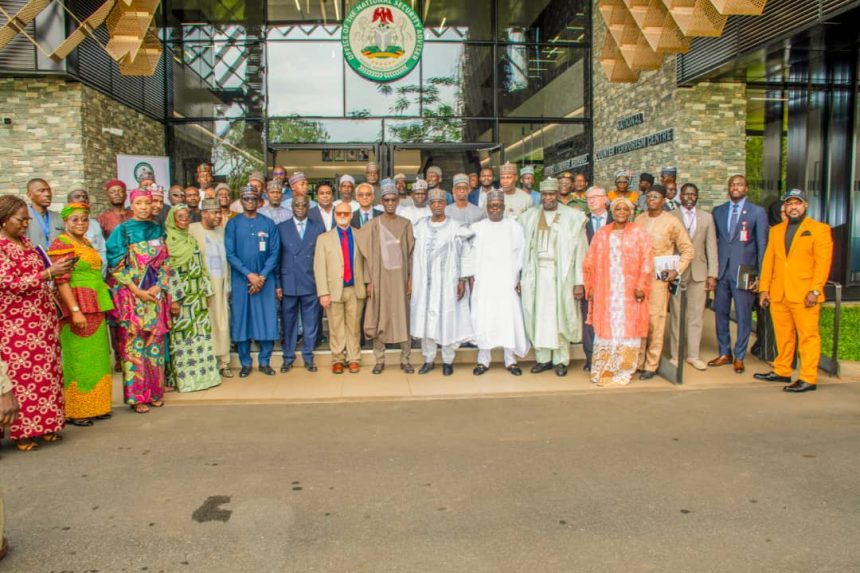…says perpetrators are out to destroy Nigeria
The National Security Adviser (NSA), on Friday, Mallam Nuhu Ribadu on Friday disclosed that over 150 million Nigerians have been affected by unending insecurity in the country over the years.
Ribadu made the declaration in Abuja while speaking on insecurity at the signing of a memorandum of understanding (MoU) between the National Counter Terrorism Centre (NCTC), Office of the National Security Adviser (ONSA) and the International Institute of Tropical Agriculture (IITA).
ALSO READ: FG adopting holistic approach to security challenges – NSA Ribadu
The NSA lamented that those Nigerians were predominantly farmers but insecurity had disrupted their way of live rendering many hungry.
Ribadu expressed the need for a whole of society approach to address the root cause of insecurity in the country.
He said, “Security is the biggest problem we are facing in all sector but the biggest victim of insecurity is Agriculture because when it came in, it interfered with our lives, Nigerians are farmers. Either you’re a farmer or from a family of farmers so all of us one way or the other it has affected us. Insecurity has turned our lives upside down. When we come together we are better off. We must come together to give our people their lives back.
“Our people are in dire need of this. I don’t think there is any country in the world today which is facing the challenges we are facing. Because we are big, we are huge in number. Populations that are affected by the insecurity in Nigeria maybe it is in excess of 120 to 150 million.”
Ribadu declared that the sole aim of the terrorists behind the general insecurity in the county was to destroy Nigeria.
He said, “There is no way in the world we will have this again. No. The bad people are moving in more. They have destroyed democracies in our neighboring countries. Sudan is on fire. Chad is something, Niger. Burkina Faso, Mali. We are the only ones standing strong in the Sahel now and thanks to our own security forces, we are surviving them. So we are in difficulties.”
On security, Ribadu affirmed that the signing of the MOU marked a pivotal moment in the nation’s journey towards sustainable peace and security.
“For too long, our focus in countering terrorism has predominantly been on kinetic responses. While it is essential, we have come to understand that true and lasting peace cannot be achieved through force alone. The root causes of violent extremism such as poverty, lack of opportunity, and social disenfranchisement must be addressed with equal vigour. This understanding informs the bedrock of our whole-of-government and whole-of-society approach,” he said.
Ribadu pointed out that the collaboration with International Institute of Tropical Agriculture on the Agribusiness and Livelihood Empowerment Project for Disarmament, Demobilization, Deradicalisation, Rehabilitation, and Reintegration, of terrorists, communities affected by violent extremism was a testament to this evolving strategy.
He added that the partnership was commitment to non-kinetic approaches that empower individuals, restore livelihoods, and promote social cohesion.
According to the NSA, Nigeria has made significant strides in demobilization, deradicalization, rehabilitation, and reintegration programmes, most notably through Operation SAFE CORRIDOR in Mallam Sidi, Gombe State.
He said following the success “We are also witnessing a growing willingness among terrorists, bandits, and kidnappers in the North West regions to surrender.
Ribadu speaking on effects of insecurity on Nigerians, added that the development presents a critical opportunity to expand Nigeria’s demobilization, deradicalization, rehabilitation, and reintegration programmes, narratives and community resilience building through agriculture vocational skill trainings.
“However, a crucial lesson learned from our past experiences is the urgent need for sustainable economic reintegration pathways. Without viable opportunities, the gains of rehabilitation can be fragile, threatening the long-term success of our efforts,” he said.
He added that agribusiness was not just an economic opportunity but an ideal model for transformation, offering vocational skills, income generation, and self-employment.
The NSA said, “It stabilises individuals and communities emerging from conflict, and provides healing to those affected by violent extremism.”
Ribadu further explained that the National Counter Terrorism Centre – International Institute of Tropical Agriculture Agribusiness and Livelihood Empowerment Project was designed to harness to provide former clients and community members with access to land, agricultural inputs, training, mentorship, and crucial market linkages, all in partnership with state and local governments, civil society, and the private sector.
He said, “Today’s signing of the Memorandum of Understanding signifies our formal commitment to this vital initiative. We envisage that this project will instill a renewed sense of purpose and dignity in individuals and conflict-affected communities. Equally, the integrated agribusiness value chain as a food security model is a monumental step in building lasting social cohesion and peace in our beloved nation.”
Speaking earlier , the National Coordinator, NCTC Major General Adamu Laka had explained that while kinetic responses to countering violent extremism remain necessary, they alone cannot bring about sustainable peace.
He, therefore, stressed the need to address the root causes of violent extremism such as poverty, marginalisation, and lack of opportunity through inclusive, whole-of-government and whole-of-society solutions.
Laka explained that Federal Government’s Disarmament, Deradicalization and Reintegration (DDR) programme, in Gombe State, had already yielded significant gatesains, with many low-risk former combatants successfully rehabilitated and reintegrated.
He said, “It is in this context that we consider agriculture as a critical tool for driving economic empowerment, restoring livelihoods, and promoting social cohesion in conflict-affected communities.”
Laka explained that the signing of the MoU marked a key milestone in the shared efforts to build resilience and reduce the drivers of violent extremism through livelihood empowerment.
He added thy the document would serve as a strategic framework to guide the implementation of the agribusiness and livelihood project, which targets ex-combatants, conflict-affected communities, and widows of fallen soldiers.
Laka said, “Through this project, beneficiaries will gain access to land, inputs, training, mentorship, and market linkages supported by collaboration with state and local governments, civil society, and the private sector.”
In his remarks, the Deputy Director General, International Institute of Tropical Agriculture- Dr Denshell Kenton said IITA since its establishment in 1987,it had been fully committed to providing agriculture and improving agriculture in Nigeria.
He promised to work towards the success of the project “I would love for my last success story in Nigeria to be that I made a small contribution to bring peace to Northern Nigeria.”
He said the principles to be followed during the implementation are not new, adding that they have been tried and tested.
“These are not quick fixes. The focus is on long-term, sustainable, positive changes that lead to communities becoming much better places to live.
“Because each person and family, one, have enough good quality food, and two, respectable incomes and living conditions that leads to the overall community being stable and prosperous. And when we have many communities, or all communities, in an area that are improved, then we have success,” he said.
Also speaking the Minister of Livestock Development, Dr Idi Muktar Maiha commended the initiative and urged the government to “replace armoured tanks with tractors” and to also “replace machine guns with milking machines” in the country sides
The minister pointed out that livestock was the quickest and easiest way of getting someone back into the society.
He promised to work with the to stamp out insecurity in the countryside.
“Once people are productively engaged, they will not be available for recruitment no matter the enticement and this is what we are looking at and our vision today in the country we want Nigeria’s countryside to be the symbol of what we want, we want tractors to replace armored tanks, tractors should replace armored tanks, we want milking machines to replace machine guns that should be the symbol let me repeat this for purposes of emphasis tractors should replace armored tanks they have no place in our countryside, milking machines should replace machine guns they have no place in our countryside this is what the ministry is driving and we are going to work with the center to achieve this,” he said.
ALSO READ FROM NIGERIAN TRIBUNE
WATCH TOP VIDEOS FROM NIGERIAN TRIBUNE TV
- Let’s Talk About SELF-AWARENESS
- Is Your Confidence Mistaken for Pride? Let’s talk about it
- Is Etiquette About Perfection…Or Just Not Being Rude?
- Top Psychologist Reveal 3 Signs You’re Struggling With Imposter Syndrome
- Do You Pick Up Work-Related Calls at Midnight or Never? Let’s Talk About Boundaries







